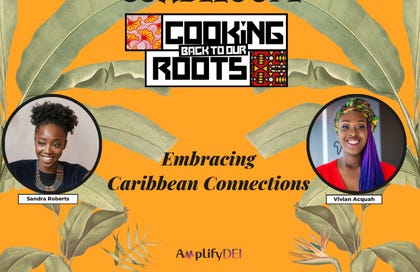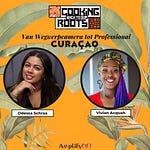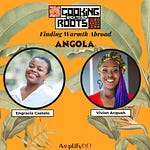Scroll naar beneden voor de NL tekst.
In this episode of the Cooking Back to Our Roots podcast, host Vivian Acquah (Certified DEI Trainer/ Consultant) engaged in a thought-provoking conversation with guest speaker Sandra Roberts (Creative Event Producer & Strategist). Together, they delved into the significance of acknowledging and embracing cultural heritage, particularly for individuals with bicultural backgrounds.
Sandra's roots in the French Caribbean Islands of Guadeloupe and Martinique provided a rich foundation for the discussion. The episode not only highlighted the importance of traditional dishes and cultural customs but also shed light on the challenges and triumphs of individuals navigating their cultural identities in various societal landscapes.
Embracing West African Culinary Heritage: A Nod to Tradition
Sandra Roberts eloquently shared her connection to traditional dishes, emphasizing the deep ties these culinary delights have to West African culture. Dishes like dombrés (similar to fufu), rice and beans, and accra, a beloved snack, not only serve as sustenance but also act as a continuation of cultural heritage. The careful preparation and consumption of these dishes hold a deeper meaning, serving as a means to honor and preserve the roots from which they originate. By embracing and celebrating these traditional dishes, individuals like Sandra pay homage to their ancestral heritage and keep the vibrant tapestry of West African culinary traditions alive.
Cultural Identity: The Intersection of Past, Present, and Future
Sandra Roberts beautifully articulated the importance of connecting the past, present, and future in the context of cultural identity. She highlighted the influential role of ancestors and the desire to make them proud through conscious actions and choices. This sentiment resonates deeply with individuals who share a similar cultural background, as it emphasizes the need to honor and carry forward the legacies of those who came before while also forging a path that reflects contemporary realities and future aspirations.
Navigating Cultural Identity: The French Caribbean Experience
With a backdrop of growing up in France, Sandra candidly discussed the complexities of navigating a cultural identity intertwined with the French Caribbean. She shed light on the identity crisis that France grapples with and the stigmas often attached to individuals from diverse backgrounds. This insight provided a poignant glimpse into the experiences of many multicultural individuals, offering a deeper understanding of the challenges they may face in reconciling their heritage with societal norms and expectations.
Championing Inclusivity and Representation: The Value of Community
Both Vivian Acquah and Sandra Roberts underscored the importance of investing in oneself, not relying on external validation, and being visible on professional platforms like LinkedIn. However, they also emphasized the invaluable support and understanding found within communities. Sandra’s emphasis on the value of community, particularly for bicultural individuals, elucidated the significance of learning and drawing strength from diverse perspectives within a community. Furthermore, Vivian’s acknowledgment of the diversity within the Caribbean underscored the need for inclusivity and representation in recognizing the multifaceted nature of cultural identities.
Embracing Diversity: A Call for Allies and Collective Progress
Sandra and Vivian’s discussion touched on the need for minorities in Europe to fight for acceptance and support from allies while also relying on themselves and their communities for upliftment and progress. This resonates deeply within the context of cultural identity and diversity, advocating for a collective effort to champion inclusivity and representation. The call for allies to support diversity and inclusion efforts underscores the shared responsibility of fostering an environment that celebrates cultural diversity and uplifts individuals from all backgrounds.
Conclusion
The enriching conversation between Sandra Roberts and Vivian Acquah on the Cooking Back to Our Roots podcast provided a powerful testament to the significance of embracing cultural identity and honoring ancestral heritage. Through the lens of traditional dishes, the complexities of navigating cultural identity, and the need for community and allies, the episode underscored the universal significance of diversity, representation, and inclusivity. As we continue to engage in conversations that celebrate cultural heritage, may we strive to create spaces that foster understanding, embrace diversity, and honor the roots from which we all draw strength and resilience.
Bio Sandra Roberts
Sandra Roberts, a French-Antillean creative event producer based in Amsterdam since 2015, is committed to crafting experiences that create impact and unite people. Having organized 500+ events fostering connections through culture, community building, and corporate events, Sandra's work has supported companies and organizations in their efforts to make a positive impact in the world.
Bio Vivian Acquah CDE®
Passionate and driven, Vivian Acquah is a Certified Diversity Executive (CDE®) who is making waves in the world of workplace wellness and DEI. With a name that literally translates to "water," Vivian has become an extinguisher of fires related to DEI, helping clients such as Heineken, LinkedIn, Google, Indeed, Deloitte, Tibco, Cargill, Swift, Acrolinx, KLM, and Zalando.
Back to our roots: the (Dutch) Antilles and the discovery of our shared past
Nederlandse versie/ Dutch version scroll below In this episode of "Cooking Back to Our Roots," Vivian Acquah (host) talks with guest speakers Edson Hato and Sacha Martina about the impact of the Dutch slavery past on the African diaspora in the Netherlands, with an emphasis on the (former) Netherlands Antilles.
Dombré
(I could only find this French version.)
Accra
Nederlands
In deze aflevering van de podcast Cooking Back to Our Roots ging host Vivian Acquah (Certified DGI Trainer/ Consultant) een thought-provoking gesprek aan met gastspreker Sandra Roberts (Creative Event Producer & Strategist). Samen verdiepten ze zich in het belang van het erkennen en omarmen van cultureel erfgoed, vooral voor mensen met een bicultural achtergrond.
Sandra's wortels op de Frans-Caribische eilanden Guadeloupe en Martinique vormden een rijke basis voor de discussie. De aflevering belichtte niet alleen het belang van traditionele gerechten en culturele gebruiken, maar wierp ook licht op de uitdagingen en triomfen van individuen die hun culturele identiteit in verschillende maatschappelijke landschappen proberen te vinden.
Het omarmen van het West-Afrikaanse culinaire erfgoed: Een knipoog naar traditie
Sandra Roberts deelde op welsprekende wijze haar band met traditionele gerechten en benadrukte de diepe banden die deze culinaire hoogstandjes hebben met de West-Afrikaanse cultuur. Gerechten zoals dombrés (vergelijkbaar met fufu), rijst met bonen en accra, een geliefde snack, dienen niet alleen als voedsel, maar zijn ook een voortzetting van cultureel erfgoed. De zorgvuldige bereiding en consumptie van deze gerechten hebben een diepere betekenis en dienen als middel om de wortels waaruit ze voortkomen te eren en te behouden. Door deze traditionele gerechten te omarmen en te vieren, brengen mensen zoals Sandra hulde aan hun voorouderlijk erfgoed en houden ze de levendige West-Afrikaanse culinaire tradities in leven.
Culturele identiteit: De kruising van verleden, heden en toekomst
Sandra Roberts verwoordde prachtig het belang van het verbinden van verleden, heden en toekomst in de context van cultural identity. Ze benadrukte de invloedrijke rol van voorouders en het verlangen om hen trots te maken door bewuste acties en keuzes. Dit gevoel resoneert diep bij mensen met een vergelijkbare culturele achtergrond, omdat het de noodzaak benadrukt om de erfenis van de voorgangers te eren en uit te dragen, en tegelijkertijd een pad te smeden dat de hedendaagse realiteit en toekomstige aspiraties weerspiegelt.
Navigeren door culturele identiteit: De Frans-Caribische ervaring
Met een achtergrond van opgroeien in Frankrijk, besprak Sandra openhartig de complexiteit van het navigeren door een culturele identiteit die verweven is met de Franse Caraïben. Ze belichtte de identiteitscrisis waar Frankrijk mee worstelt en de stigma's die vaak verbonden zijn aan mensen met verschillende achtergronden. Dit inzicht bood een aangrijpende blik op de ervaringen van veel multiculturele mensen en een beter begrip van de uitdagingen waarmee ze te maken kunnen krijgen bij het verzoenen van hun erfgoed met maatschappelijke normen en verwachtingen.
Kampioen in inclusiviteit en vertegenwoordiging: De waarde van de gemeenschap
Zowel Vivian Acquah als Sandra Roberts benadrukten het belang om in zichzelf te investeren, niet te vertrouwen op externe validatie en zichtbaar te zijn op professionele platformen zoals LinkedIn. Ze benadrukten echter ook de onschatbare steun en het begrip binnen gemeenschappen. Sandra's nadruk op de waarde van de gemeenschap, vooral voor biculturale individuen, verduidelijkte het belang van leren en kracht putten uit verschillende perspectieven binnen een gemeenschap. Verder onderstreepte Vivian's erkenning van de diversiteit binnen het Caribisch gebied de behoefte aan inclusiviteit en vertegenwoordiging bij het erkennen van de veelzijdige aard van culturele identiteiten.
Diversiteit omarmen: Een oproep tot bondgenoten en collectieve vooruitgang
De discussie van Sandra en Vivian ging over de noodzaak voor minderheden in Europa om te vechten voor acceptatie en steun van bondgenoten, terwijl ze ook op zichzelf en hun gemeenschap moeten vertrouwen voor verbetering en vooruitgang. Dit resoneert diep binnen de context van cultural identiteit en diversiteit, waarbij gepleit wordt voor een collectieve inspanning om inclusiviteit en vertegenwoordiging te preferderen. De oproep aan bondgenoten om inspanningen op het gebied van diversiteit en inclusie te ondersteunen, onderstreept de gedeelde verantwoordelijkheid voor het bevorderen van een omgeving waarin culturele diversiteit wordt gevierd en mensen met alle achtergronden worden opgewaardeerd.
Conclusie
Het inspirerende gesprek tussen Sandra Roberts en Vivian Acquah in de podcast Cooking Back to Our Roots was een krachtig bewijs van het belang van het omarmen van culturele identiteit en het eren van erfgoed van voorouders. Door de lens van traditionele gerechten, de complexiteit van het navigeren door culturele identiteit en de behoefte aan community en allies, onderstreepte de aflevering de universele betekenis van diversiteit, representatie en inclusiviteit. Als we doorgaan met het voeren van gesprekken over cultureel erfgoed, mogen we dan streven naar het creëren van ruimtes die begrip kweken, diversiteit omarmen en de wortels eren waaruit we allemaal kracht en veerkracht putten.














Share this post